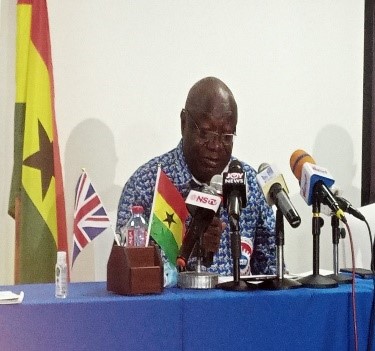The Minister for Environment, Science, Technology and Innovation, Dr. Kweku Afriyie, has said Ghana requires between US$9.3 and US$15.5billion of investment to implement the updated National Determined Contribution (NDCs) to fight climate change from 2021 to 2030.
According to him, US$3.9billion will be required to implement the 16 unconditional programmes of action under the NDCs till 2030, and this will be solicited from development partners and climate finance programmes.
He further stated that government will mobilise US$5.4billion of the total amount needed from public sector and private sector sources, as well as Carbon markets, to finance 31 conditional NDC programmes of action from now to 2030.
The minister disclosed this at the press briefing on the upcoming 26th United Nation Climate Change Conference (COP26), and added that Ghana also needs an additional US$3million bi-annually to support coordination actions and regular international reporting on the NDCs.
He said the updated NDCs, which are currently awaiting presidential assent, cover 19 policy areas and translate to 47 mitigation and adaptation programmes that Ghana has to implement.
“The updated and enhanced nationally-determined contribution lays emphasis on mitigation and adaptation measures as well as climate finance by prioritising the concrete intervention in the following areas: building resilience to protect vulnerable communities and eco-systems; advancing climate responsive food production systems; and by lowering deforestation.
He added that NDCs will also prioritise scaling-up the penetration of renewable energy and sustainable energy transition; promoting green electric mobility; and accelerate the country’s efforts to mobilise investment into climate actions.
He further stated that it is expected that by implementing the 19-policy action Ghana will achieve the following by 2030: generate absolute greenhouse gas emessions reduction by 64 million tonnes of carbon dioxide; avoid at least 2,900 premature deaths from bad air quality; and create over 1 million decent and green jobs for the benefit of women and the youth.
He hinted that the policy inventions are necessary because the Ghanaian economy and rural livelihoods rely on natural resource-based sectors such as agriculture and energy, water, transport, lands and natural resources which are vulnerable to the impact of climate change, either directly or indirectly.
He said although Ghana is a small emitter of greenhouse gases, it is actively contributing to the global fight in compatting climate change and the multitude of problems which come with it.
He said aside from developing the NDCs, Ghana has signed onto the United Nations Framework Convention on Climate Change (UNFCCC) and the Paris Climate Agreement.
On her part, the Chargé d’affaires for the British High Commission to Ghana, Madam Beth Cadman, commended the government of Ghana for the effort it is making to combat climate change and urged it prioritise the needs of Ghana at COP 26.
She said that the UK will continue workinng with Ghana long after the crowds have left Glasgow, to help implement the Ghana NDCs.
On COP 26, she said the UK is proud to host the programme in partnership with Italy – adding they expect 30,000 delegates including 125 world leaders to participate.
COP 26 will be held in Glasgow from 31st October to 12th November 2021, on the theme ‘Keeping 1.5 alive’.










